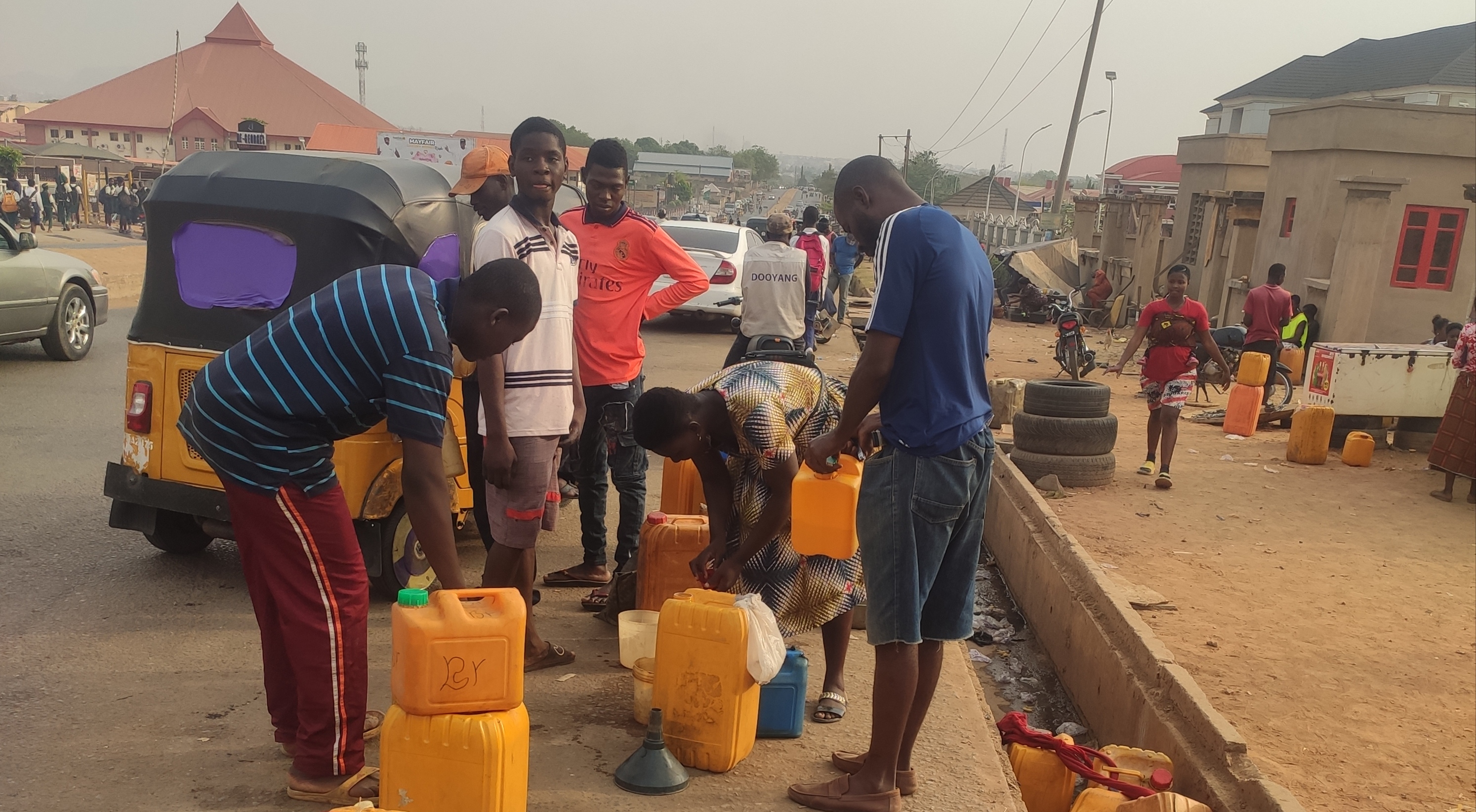Africa's top oil producer, Nigeria is going through one of its worst energy crises as scarcity of Premium Motor Spirit (PMS) also known as petrol enters its sixth week.
The crisis which began in the early weeks of February seems to be getting worse by the weeks with black market hawkers joining motorists, motorcyclists and tricyclists in lamenting about the worsening situation.
When Timeline.ng set out on Monday morning to observe the situation around filling stations at the Nyanya-Jikwoyi axis of Abuja, little did he expect to see very long queues by 6am with black market hawkers making brisk business adjacent filling stations.
"It's a terrible situation we have here," said Eze Chinedu, a transporter who positioned his vehicle in one of the disjointed queues around A.A. Rano filling station at Jikwoyi road.
“Everyone is complaining about the situation, especially passengers who now pay more in transport fares as they directly bear the brunt of the hours we spend on queue to obtain PMS.
For tricyclist (keke) rider - Sebastian Gusar, queueing in front of a petrol station does not guarantee that one will eventually obtain the product but the wait is worth it.
“We keke riders are finding it difficult to obtain fuel at the rate of #162 - #165. I have been here since 5am. I can't say if we will get the product today but we can only keep hopes alive.
When asked if he ever considered patronising black market hawkers as an alternative option Gusar retorted: “How can I buy one litre at the rate of #400 - #500 from black market hawkers? You can imagine how much would be spent to get 10 litres at such rate. There's also the question of how much profit can I reap from such decision?”
Timeline.ng can recall that the fuel scarcity in February was sparked by what the Federal Government described as “recently imported dirty fuel.” It explained that the methanol found in the fuel exceeded Nigeria’s specifications.
The development led to the immediate withdrawal of all affected products, resulting in a shortage of petrol and queues appearing in major cities before spreading to all parts of the country.
Last month, the Nigerian National Petroleum Corporation (NNPC) assured Nigerians that an order for over 2.1 billion litres of methanol-free Petroleum had been placed to bring an end to the scarcity.
The NNPC went on to assure Nigerians last week that petroleum products have been distributed nationwide to resolve the fuel crisis. However, the scarcity continues to linger instead of abating.
“Is the government playing games with us, why are they finding it difficult to make fuel available?“ quizzed Mrs Robinson as she sat in her car on the queue at A.A. Rano, bracing up for what could be a long frustrating wait.
“If they want to increase the price and make fuel available they should come out and explain themselves instead of subjecting citizens to unnecessary stress,” she added.
Black Market Hawkers lament
In the heart of Jikwoyi is Conoil fuelling station, home to where a commercial bike rider, Prince Japhet described as the “headquarters of black market hawkers.”
Japhet's familiarity with the 'headquarters' was not unconnected to his patronage of their services.
“I get PMS from the black market even though it costs 400-500. I can afford it because the bike is mine.
Therefore, I have no worries about what profit I can reap after remittances unlike my colleagues with hired biked lined up in fuel stations.”
Despite being a beneficiary of their illegal trade, Japhet went on to blame the hawkers for the scarcity of PMS stressing that the crisis was worse because of their brisk business.
“If there is no such thing as black market, PMS would be more available for motorists. In fact, some filling stations prefer to sell to the black market at costlier price instead of supplying to motorists at approved price.”
While Nigerians might be quick to believe that hawkers make insane money during scarcity and would prefer that the situation linger on, checks by Timeline.ng revealed that the case is not always true.
A female hawker, Jennifer said she wished the scarcity would end as soon as possible. According to her: “Forget the profit involved, I also suffer ripple effects caused by the scarcity with the most obvious being the hike in transport fare.
“Besides, the profit isn't much. I get 25 litres for #4,700, grease the palm of the fuel attendant with #1,500 and make just about #2,500 in profit. I'm only in this business because there isn't any other job for me.
Re-echoing Jennifer's claim, another hawker who identified as Mohammed disclosed that hawkers have to travel far to neighbouring Nasarawa State to get the product, adding that a significant percentage of whatever appears to be their profit in the selling price actually covers the cost of transportation.
Mohammed went on to express his wish for an immediate end to the scarcity, stressing that “the masses are suffering, there's great risk involved in this business and the situation isn't worth any selfish interest.”
Speaking of the risks involved, another hawker identified as Rachel lamented that tricyclists steal their products in a drive-by fashion, adding that they often suffer raids from taskforce who confiscate the entire product whenever they pounce.
“Aside from the taskforce, police and civil defence also conduct raids. We have no choice but to run whenever we spot them. While we are it, we take anything we can carry but there's isn't much one can carry when fleeing,” said Rachel.





